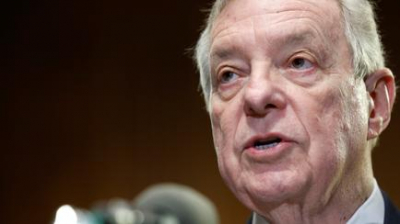My training data only includes information up until January 2022, and I can't provide real-time updates. As of my last update, Hamas was designated as a terrorist organization by several countries and international bodies, including Israel, the United States, the European Union, and others.
The Interwoven Realities: Biden's Balancing Act Amidst Israel's Escalation
As the Biden administration navigates its strategy to de-escalate tensions between Israel and Iran, its efforts to temper Israel's looming operation in Rafah emerge as a crucial, intertwined concern. President Joe Biden finds himself in a delicate position, wielding both influence as a key international player and a longstanding alliance with Israeli leadership. Monica Marks, a professor at New York University, underscores the intrinsic link between the Israeli-Palestinian conflict and broader regional dynamics, highlighting the pivotal role of Biden's stance in potentially shaping Israel's course of action regarding Rafah's civilians.
The signals from Israel indicate a steadfast determination to proceed with the Rafah operation. Despite reports of preparations underway, including the printing of evacuation leaflets, logistical complications arising from the recent Iran attack have introduced delays. Israeli Defense Minister Yoav Gallant's briefing on Rafah underscores the gravity of the situation, echoed by ongoing discussions between U.S. and Israeli officials.
Amidst this uncertainty, the residents of Rafah endure a harrowing limbo, trapped in a precarious enclave that represents Gaza's last vestige of functionality. Ghada Alhaddad of Oxfam paints a vivid picture of the palpable fear gripping civilians, as airstrikes persist and the specter of a ground invasion looms large. The pervasive anxiety prompts desperate attempts to seek refuge elsewhere in Gaza, only to find devastation and despair awaiting them.
As Biden walks the tightrope of diplomacy, the fate of Rafah's inhabitants hangs in the balance, emblematic of the broader complexities and human toll of the Israel-Palestine conflict.
Amidst Uncertainty, Humanitarian Concerns Mount for Palestinians
As governments deliberate their strategies amidst escalating tensions, the specter of an impending attack on Rafah casts a shadow over the humanitarian landscape in Palestine. Aid organizations voice profound apprehension about the potential fallout, warning of dire consequences for already vulnerable populations grappling with food scarcity, relentless bombardment, and forced displacement.
Representatives from prominent aid groups express grave concerns to HuffPost, emphasizing the precariousness of the current situation. They highlight the inadequacy of existing support mechanisms and underscore the imperative need for comprehensive plans to mitigate the humanitarian fallout of a potential assault on Rafah. Despite President Biden's advocacy for increased aid following the tragic loss of relief workers, the absence of concrete measures to safeguard civilians exacerbates anxieties on the ground.
Scott Paul of Oxfam America voices a prevailing sentiment among aid workers, fearing that geopolitical maneuverings may eclipse efforts to protect Palestinians teetering on the brink of famine. With thousands of lives already lost since the onset of Israel's offensive, there is mounting apprehension that Palestinian welfare will be sidelined amidst broader regional dynamics.
A sense of disillusionment pervades among humanitarian actors, with doubts about the efficacy of U.S. intervention to moderate Israel's actions in Rafah. As conditions deteriorate and the trajectory of the conflict remains uncertain, aid groups find themselves in a state of limbo, grappling with the deliberate ambiguity surrounding Israel's intentions.
Despite the urgency of the situation, responses from key stakeholders, including Israel and the Biden administration, are elusive. Requests for comment on the unfolding crisis go unanswered, reflecting the pervasive opacity surrounding efforts to address the mounting humanitarian crisis.
Against this backdrop of uncertainty, experts underscore three undeniable truths: the imperative for Israel and the Biden administration to confront the looming humanitarian catastrophe, the urgent need for tangible actions to alleviate Palestinian suffering, and the sobering reality that time is running out for decisive intervention.
My training data only includes information up until January 2022, and I can't provide real-time updates. As of my last update, Hamas was designated as a terrorist organization by several countries and international bodies, including Israel, the United States, the European Union, and others.
Navigating the Complexities: Balancing Humanitarian Imperatives and Geopolitical Realities
Amid escalating tensions and renewed hawkish rhetoric following Tehran's strike on Israel, the prospects for urging Israeli compliance with international law and addressing pressing humanitarian concerns in Gaza grow increasingly challenging. A humanitarian organization insider underscores the formidable task facing the Biden administration and Congress: reconciling the imperative to halt Israeli military actions in Gaza with the need to safeguard Israeli security interests against Iranian threats. However, the prevailing sentiment suggests that the latter may take precedence over the former, raising concerns about the prioritization of geopolitical considerations over humanitarian imperatives.
Despite Biden's aversion to regional conflict, there is a growing recognition within his administration of the pivotal importance of preventing an Israeli offensive in Rafah. Matt Duss of the Center for International Policy highlights the administration's efforts to contain the humanitarian crisis within Gaza, albeit at the expense of adopting a callous and potentially perilous approach.
Egypt's warnings about the ramifications of a Rafah assault underscore the broader regional implications of escalating tensions. Concerns about potential mass crossings into Egypt and domestic pro-Palestinian activism in U.S.-aligned governments like Jordan further complicate efforts to navigate the geopolitical landscape.
Meanwhile, the dire humanitarian situation in Gaza persists, with inadequate aid reaching those in need despite claims of progress from Israeli authorities. Discrepancies between Israeli assertions of improved aid access and the experiences of aid workers underscore the ongoing challenges in delivering essential assistance to Gaza's population.
As Brett McGurk acknowledges changes in Israel's treatment of aid, the discrepancy between official rhetoric and on-the-ground realities underscores the urgent need for concrete action to address the humanitarian crisis in Gaza. Balancing geopolitical considerations with humanitarian imperatives remains a daunting task, requiring sustained international engagement and concerted efforts to alleviate the suffering of Palestinians in Gaza.
Focusing on Outcomes: Addressing Humanitarian Needs Amidst Challenges
Bill O'Keefe of Catholic Relief Services underscores the importance of prioritizing outcomes over mere inputs in addressing the humanitarian crisis in Gaza. While increased aid deliveries are welcomed, the ultimate goal remains the reduction of malnutrition and the prevention of civilian casualties. O'Keefe emphasizes the need for sustained commitment to achieving tangible results, rather than becoming complacent with temporary measures.
Concerns persist regarding discrepancies in aid delivery metrics, as highlighted by United Nations spokesperson Jens Laerke's remarks about Israel's counting practices. Aid workers express frustration over the lack of clarity regarding plans for additional aid entry points, such as the Erez land crossing and the Ashdod port, despite cabinet approval. The delay in repairing vital infrastructure further impedes efforts to provide essential aid to vulnerable populations.
The limited operational hours and screening capacity at the Kerem Shalom crossing exacerbate logistical challenges, prompting calls for increased staffing and screening capabilities. Appeals to ease restrictions on aid supplies labeled as "dual-use" remain unanswered, hindering efforts to address critical needs effectively.
A shift towards a results-oriented approach is imperative, prioritizing the delivery of specific types of aid and services tailored to meet the pressing needs of Gaza's population. Emphasizing the importance of targeted interventions, aid workers stress the necessity of supplying essential medical equipment and personnel to mitigate the impact of the crisis.
Israel could play a pivotal role in alleviating the humanitarian situation by restoring electricity supplies to Gaza and facilitating the transportation of aid to hard-to-reach areas. Despite ongoing challenges, concerted efforts are required to ensure that humanitarian assistance reaches those most in need, particularly in northern Gaza, where famine looms large.
Humanitarian Crisis Escalates Amidst Operational Hurdles and Displacement
UNICEF's efforts to deliver vital supplies to northern Gaza faced significant obstacles last week, according to Tess Ingram, who participated in convoys attempting to navigate through congested routes and stringent Israeli checkpoint regulations. Delays and restrictions hampered the timely distribution of fuel and food, exacerbating an already dire situation.
Upon reaching northern Gaza, Ingram was confronted with heartbreaking scenes of malnourished children at Kamal Adwan hospital, underscoring the cruelty of the crisis unfolding amidst ample resources for treatment. The prospect of an Israeli attack on Rafah looms ominously, threatening to uproot traumatized Palestinians from their already precarious shelters.
Abood Okal's account of his family's displacement highlights the harsh realities faced by Palestinians seeking refuge amidst escalating hostilities. The overcrowded conditions and lack of basic amenities underscore the urgent need for intervention to alleviate their suffering.
Conditions in alternative shelters offer little respite, with families enduring unsanitary living conditions and limited access to essential services. Soraya Ali's observations in Deir Al Balah and Khan Yunis paint a grim picture of widespread deprivation and destruction, further exacerbating the humanitarian crisis.
The pervasive presence of unexploded ordnance and the destruction of critical infrastructure render many areas uninhabitable, leaving displaced families with few viable options for safe refuge. Urgent action is needed to address the escalating humanitarian crisis and ensure the safety and well-being of vulnerable populations in Gaza.
Humanitarian Concerns Mount as Conflict Threatens Rafah
The looming specter of major fighting in Rafah compounds the already dire humanitarian crisis in Gaza, posing significant challenges for aid organizations striving to provide assistance to vulnerable populations. For civilians who have endured months of overcrowding and shortages, the prospect of relocation amidst escalating hostilities exacerbates their precarious situation.
The need for comprehensive support extends beyond mere food and shelter, as emphasized by Oxfam's Alhaddad and Bill O'Keefe. Essential services such as water, sanitation, and healthcare are imperative for safeguarding the well-being of displaced individuals. However, the logistical complexities and security risks associated with an invasion of Rafah present formidable obstacles to delivering critical aid.
Rafah serves as a crucial hub for humanitarian operations, housing storage and distribution facilities, as well as accommodations for aid workers. A ground incursion in Rafah would not only disrupt vital aid efforts but also unravel the fragile semblance of stability that aid organizations have painstakingly established.
The potential repercussions of full-scale conflict in Rafah are grave, with Ali warning that it could unleash the deadliest chapter of the ongoing conflict in Gaza. The devastating impact on civilian lives, coupled with the exacerbation of aid shortages, underscores the urgent need for concerted international action to prevent further escalation and alleviate the suffering of Gaza's population.
In conclusion, the escalating tensions and looming threat of major conflict in Rafah represent a critical juncture in the ongoing humanitarian crisis in Gaza. As aid organizations grapple with logistical challenges and dwindling resources, the prospect of a ground incursion poses an existential threat to the fragile aid response infrastructure in the region. The potential consequences of full-scale fighting in Rafah are dire, with the lives of countless civilians hanging in the balance. Urgent international intervention is imperative to prevent further escalation and mitigate the humanitarian impact of the conflict, ensuring the safety and well-being of Gaza's vulnerable populations. Only through concerted efforts to address the root causes of the crisis and uphold the principles of humanitarianism can we hope to avert further tragedy in Gaza and pave the way for a sustainable peace in the region.








Recovery Underway: Damaged Container Ship Dali Returns to Port After Baltimore Bridge Collision
Revolutionizing the Insurance Value Chain: Unleashing the Power of Generative AI
Usman Arshad: Rising Star in English Cricket
Luke Altmyer: Rising Star in American Football
Visionary Filmmaker: Exploring the Artistry of Janni Bach
Ariella Azoulay: Pioneering Scholar and Visionary Advocate for Ethical Visual Culture
Unveiling the Artistry of Josep Alsina: A Journey into Innovation and Expression
Championing Education and Social Justice: The Legacy of Nancy Allan